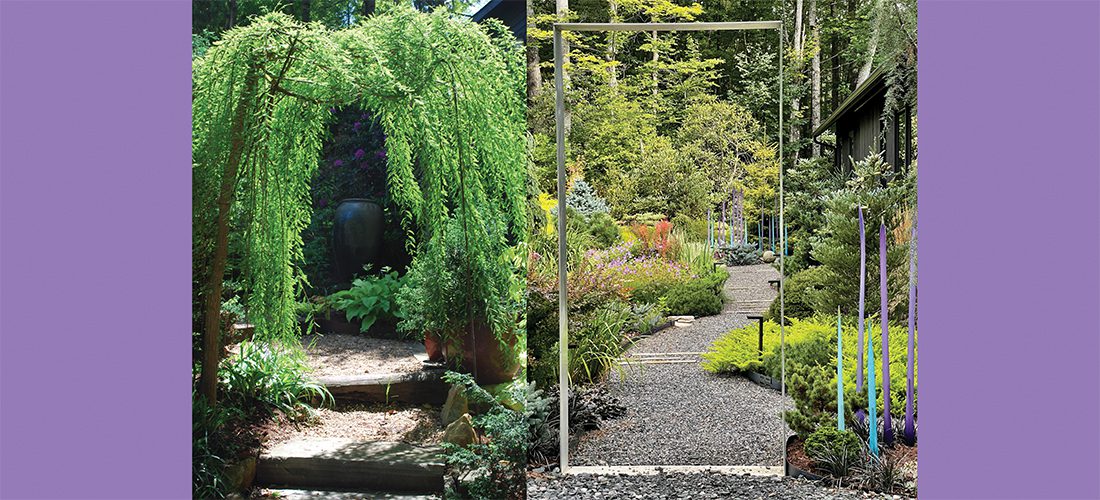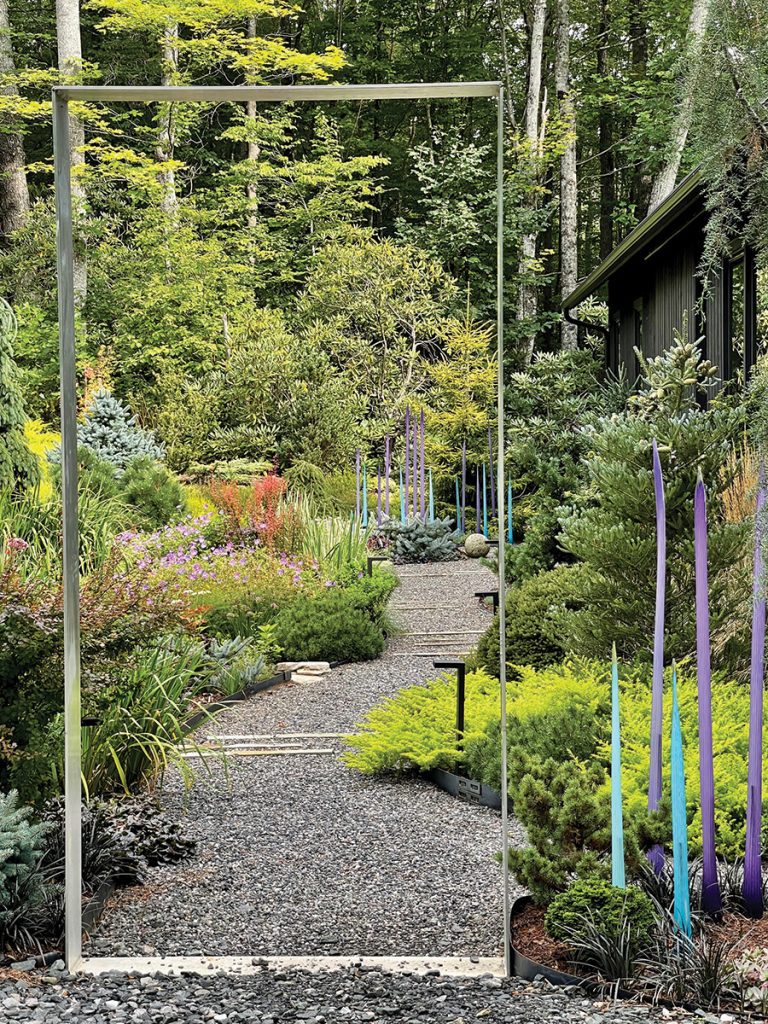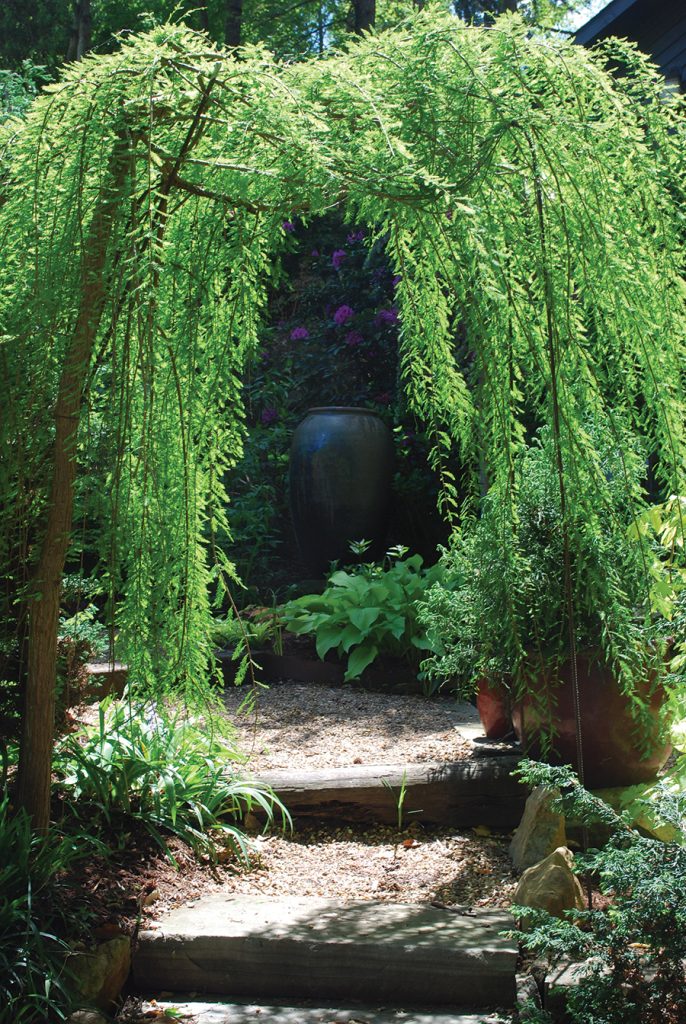Gardening: First impressions
November 30, 2022

Give your garden entrance a personality.
by Jay Sifford
Psychologists tell us that when we meet someone new, we have approximately eight seconds to make an initial impression, good or bad. I believe gardens are the same. If the best gardens are metaphorical, as I think they are, the journey and their story begin at the front gate and continue to unfold as we navigate through them. What story does your garden entrance tell? Is it flat, predictable and mundane, or is it full of intrigue that leads to a rich story line? What do those first eight seconds say to those who encounter it for the first time?
Traditionally, a garden entrance might be a simple white picket or black metal gate, or a basic arbor covered with ivy, clematis or jasmine. Such an entrance, while perhaps visually pleasing and balanced, can be compared to a lukewarm handshake. Honestly, there’s little warmth, inspiration and excitement generated. Fortunately, there are plenty of alternatives that will create excitement and begin to tell the story that will unfold as people walk through.
I love portals. Reminiscent of a good science fiction novel, they emphasize the fact and feeling that you are entering into a special place. A garden is, by definition, a special place set apart from the world at large. Portals are usually minimalistic in design and function as a large picture frame, encapsulating the axial view of the garden beyond.

Portals in the garden emphasize the fact that you are entering a special place.
Portals can be built of nonrusting aluminum, wood for a more rustic vibe, or stone, like an Asian moon gate. Regardless of style and material, they should echo the personality of the space and frame a view that draws visitors in.
Entryways can be the preface to a themed garden. For example, antique Chinese doors can serve as a prelude for an Asian-inspired woodland garden. Oversized, solid gates alter the perceived scale of the garden visitor and elicit emotion even before the threshold is crossed. Additionally, solid gates generate a sense of mystery and curiosity about what lies beyond
Architectural salvage yards and antique shops are worthwhile destinations in your search. You may need to oil, paint, seal or otherwise protect your finds in order to preserve them.
For your special space, consider a barred gate that reflects your story or personality, and one that sets expectations. A friend of mine in south Florida owns a famous orchid nursery, specializing in vandas. His front gate his adorned with a giant cast metal vanda flower. Options to consider might be a family crest, a favorite dog breed or a signature garden plant. Be bold and write the preface to your story on your garden gate.
Not all gardens are gated, but that does not mean that you cannot make a personal statement at the outset. Consider installing a wooden post or stone pillar and, rather than topping it with the expected outdoor lighting fixture, choose a favorite unique piece of sculpture. The vertical shape of the pillar creates a margin that helps direct the eye onto the pathway that lies just beyond, while the sculptural piece sets the tone. Be creative with your sculpture choice. A mass-produced product made of an inferior material will not generate the feeling that one is entering into a unique and special place. An “I’ve seen this before” is not preferred commentary.

This ‘Cascade Falls’ bald cypress, trained on a simple rebar arbor in Sifford’s former garden, generated more interest than any other tree, he says. “The loose weeping branches required parting by the garden visitor, forcing them to physically encounter the garden. In this way, it was reminiscent of the strands of beads that adorned door thresholds in the 1960s.”
When we think about a planted garden entryway, we generally think of a vine-covered arbor. If we begin to think outside of the proverbial box, we will realize that there are many more interesting options. A group of three columnar evergreens could be planted on one side of the garden entrance, with a single specimen of the same species planted on the opposite side. Avoid installing one plant on either side as this reads as too predictable or, worse yet, intimidating. Another option for a planted entryway could be a weeping tree such as a ‘Cascade Falls’ bald cypress, a trained weeping Norway spruce or blue Atlas cedar.
Your imagination is the limit when it comes to giving your garden a unique personality from the outset. Make the preface to your story a memorable one. SP
Jay Sifford is a Charlotte-based landscape designer who specializes in contemporary, Asian and transitional gardens. His work has been featured in Southern Living, Country Gardens and Fine Gardening, as well as Houzz and several books. siffordgardendesign.com